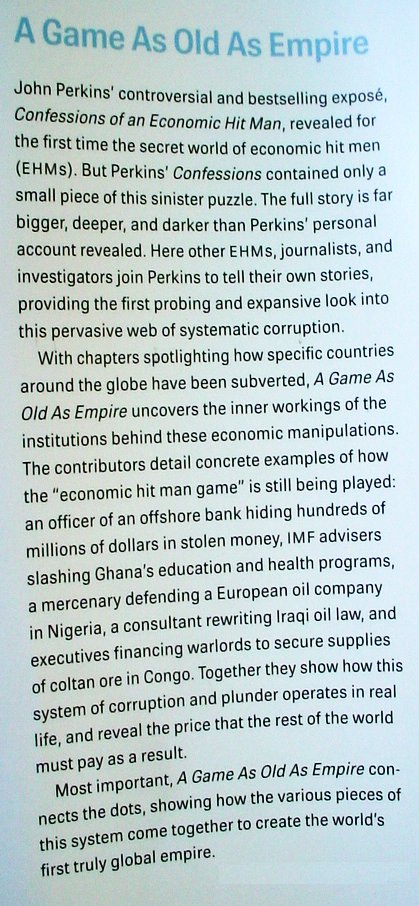
I heard about this book from an email
about the book tour Steven Hiatt was on. I went to the event at
Keplers, and it was interesting. Steven explained that doing the book
tour for An Economic Hit Man, John Perkins had been dismissed by many
mainstream figures as "an isolated case" or "the exception to the
rule". He had decided that the only way to fight that kind of reasoning
was to get other people with similar storys to come forward and share
what they knew. This author had compiled some of those stories
into this volume. He called it "the struggle for supremacy of dollars
over the people."
Reading the book bears out that
comment. In one chapter a security guard protecting an oil platform in
the Niger Delta contemplates how the first experience with the British
was their stealing slaves to sell in the new world. Then later they
were exploiting for palm oil. Now it's petroleum they steal. Later in
the same chapter he talks about the struggle for human rights waged at
stockholder meetings in the west, which had some impact for a while.
Then the Chinese came along to undercut these efforts and reignite the
race to the bottom. It seems that all the local people get out of the
oil is a polluted environment. Oil company investors and executives get
lots of dollars.
In another chapter a former World Bank
employee (Steve Berkman) talks about how every development project
seems to cost four or five times what anybody would expect, and they
rarely achieve the goals the money was loaned to accomplish. Instead
corruption of leaders seems to be the main value produced. Then they
wander off, and the country is left with a large lump of additional
debt and a poorly constructed (whatever). The next leader does
something else in the same vein. Berkman marvels that the World Bank
never seems to learn that pushing money out the door so aggressively
isn't doing good things. He never explains where the money comes from,
but he does notice there are now large debt numbers on many balance
ledgers. Of course the people that created those debts, both the loan
officers and the loan recipients, are long gone...
Actually, there are lots of stories about debt. One chapter is about a guy that gets out of a fancy college and gets a job making loans to third world entities. Another is about a banker that hides the cut of the debts the corrupt officials skim off. Then at the end of the book there is a detailed analysis of why institutions like the World Bank can't seem to forget about these debts, even though they seem to be unpayable and do nothing but bleed off assets that could be used to develop the countrys that can't pay them. That contributor notices that attempts to pay down debt usually result in new debt being taken out. I was struck by the parallels between those countrys and my house poor neighbors.
The final chapter explains that the answer to the problem is the global justice movement that has been developing in a number of quiet enclaves. They burst out of the shadows periodically, making the news in incidents like the "Battle of Seattle", when ministerial trade negotiations were stopped cold by activists in the street. She urges people that want to get involve with change to visit her website, www.theBushAgenda.net.
Actually, there are lots of stories about debt. One chapter is about a guy that gets out of a fancy college and gets a job making loans to third world entities. Another is about a banker that hides the cut of the debts the corrupt officials skim off. Then at the end of the book there is a detailed analysis of why institutions like the World Bank can't seem to forget about these debts, even though they seem to be unpayable and do nothing but bleed off assets that could be used to develop the countrys that can't pay them. That contributor notices that attempts to pay down debt usually result in new debt being taken out. I was struck by the parallels between those countrys and my house poor neighbors.
The final chapter explains that the answer to the problem is the global justice movement that has been developing in a number of quiet enclaves. They burst out of the shadows periodically, making the news in incidents like the "Battle of Seattle", when ministerial trade negotiations were stopped cold by activists in the street. She urges people that want to get involve with change to visit her website, www.theBushAgenda.net.
This book has been my transit read for
the last two months. I seem to get another chapter read every
time I go to San Francisco or San Jose. Then things in the read that I
can't forget are part of what I talk about for a week. I recommend it.
I
would have put it down long ago if it wasn't worth reading.
Tian Harter
May 25th, 2007
May 25th, 2007